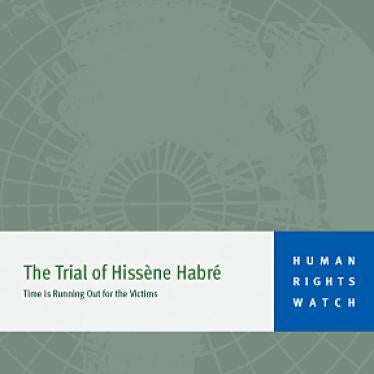(Dakar, February 13, 2015) – The ruling on February 13, 2015, to move ahead with the trial of Hissène Habré, Chad’s former dictator, is a milestone in the long campaign to bring him to justice, Human Rights Watch said today.
After a 19-month investigation, a four-judge panel of the Extraordinary African Chambers within the Senegalese courts found that there was sufficient evidence for Habre to face charges of crimes against humanity, war crimes, and torture. A trial is expected to get under way in Senegal in May or June.
“After so many years, Habré’s victims are now on the verge of seeing justice done for what they have endured,” said Jacqueline Moudeina, lead lawyer for the victims and president of the Chadian Association for the Promotion and Defense of Human Rights (ATPDH). “Getting Hissène Habré before a court is an enormous victory for justice.”
Habré’s trial will be the first in which a country tries the former ruler of another country for alleged human rights crimes.
Habré is accused of thousands of political killings and systematic torture during his presidency, from 1982 to 1990, when he was deposed by President Idriss Deby Itno and fled to Senegal. After a 22-year campaign by Habre’s victims, the Extraordinary African Chambers were established in February 2013 to prosecute the worst crimes during his rule. The chambers indicted Habré in July 2013 and placed him in pretrial detention.
“This case shows that it is possible for victims, with tenacity and perseverance, to bring a dictator to justice,” said Reed Brody, counsel for Human Rights Watch who has worked with Habré’s victims since 1999. “A fair and transparent trial for Hissène Habré would now demonstrate that courts in Africa can be empowered to provide justice for African victims of crimes committed in Africa.”
The decision by the four investigating judges brings to a close the pretrial investigation. During that phase, the judges carried out four missions to Chad; interviewed about 2,500 witnesses and victims; analyzed thousands of documents from Habré’s political police; seized papers and effects from Habre’s two Dakar homes; assigned experts to dissect Habré’s command structure; and uncovered mass graves.
On February 6, the chambers’ chief prosecutor, Mbacké Fall, requested that the judges commit Habré to trial on charges of crimes against humanity, war crimes, and torture, as the judges have done.
The trial will be conducted before a panel of two Senegalese judges and a non-Senegalese judge from another African Union (AU) member state, who will also serve as president of the chamber. The chambers’ statute provides for the participation of victims as civil parties, represented by counsel, and for the award of reparations.
In 2013, Prosecutor Fall sought an indictment of five other officials from Habré’s administration suspected of being responsible for international crimes. They have not been brought before the court, however. Three of the suspects are at large, while the other two, Saleh Younouss and Mahamat Djibrine, are currently standing trial in a Chadian court on similar charges, and Chad has refused to transfer them to Dakar.
Habré does not recognize the chambers’ legitimacy and, through his lawyers, has refused to participate in the proceedings. The court should continue scrupulously to respect Habré’s rights, Human Rights Watch said.
It is the first time that the use of universal jurisdiction leads to a trial on the African continent. “Universal jurisdiction” is a concept under international law that allows national courts to prosecute the most serious crimes even when committed abroad, by a foreigner and against foreign victims.
Habré’s victims greeted the news of his committal with satisfaction.
“I have been waiting more than two decades to see Hissène Habré in court,” said Clément Abaifouta, president of the Association of Victims of the Crimes of Hissène Habré’s Regime (AVCRHH), who as a political prisoner during Habré’s rule was forced to dig mass graves and bury hundreds of other detainees. “We are finally going to be able to confront our main tormentor and regain our dignity as human beings.”
Background
Habré’s one-party rule was marked by widespread atrocities, including waves of ethnic cleansing. Files of Habré’s political police, the Direction de la Documentation et de la Sécurité (DDS), which were recovered by Human Rights Watch in 2001, reveal the names of 1,208 people who were killed or died in detention, and 12,321 victims of human rights violations.
The United States and France supported Habré throughout his rule, seeing him as a bulwark against Libya’s Muammar Gaddafi. Under President Ronald Reagan, the US gave covert CIA paramilitary support to help Habré take power.
Habré was first indicted in Senegal in 2000, but the country’s courts said that he could not be tried there, so his victims filed a case in Belgium. In September 2005, after four years of investigation, a Belgian judge indicted Habré and Belgium requested his extradition. Senegal refused to send Habré to Belgium, and spent the next three years stalling on a request from the AU. Belgium then filed a case against Senegal at the International Court of Justice (ICJ). On July 20, 2012, the court ordered Senegal to prosecute Habré “without further delay” or to extradite him.
After Macky Sall’s election as president of Senegal in April 2012, Senegal and the AU agreed on a plan to create Extraordinary African Chambers to conduct the trial within the Senegalese judicial system. The chambers can prosecute “the person or persons most responsible” for international crimes committed in Chad between June 7, 1982, and December 1, 1990.






